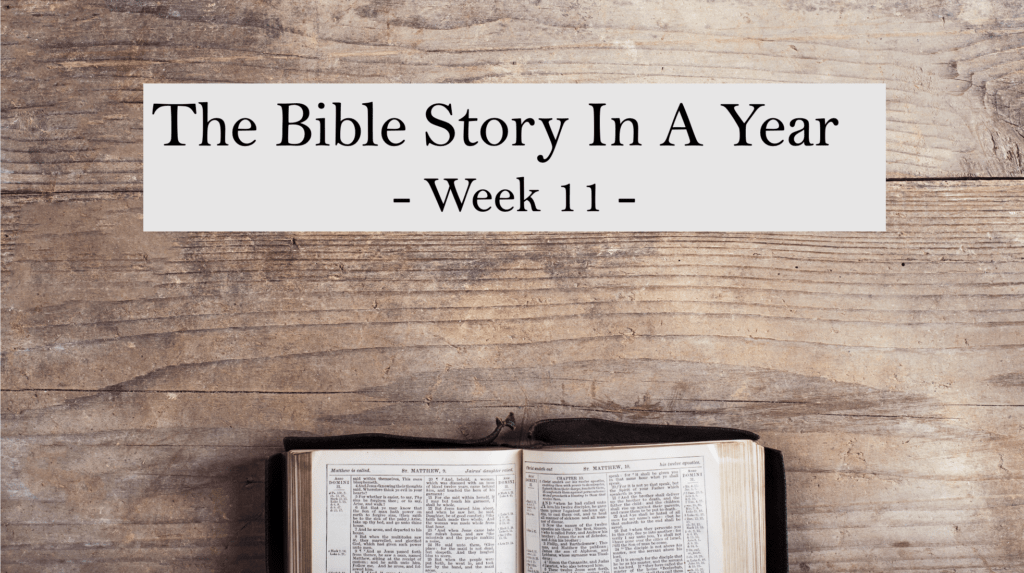Downloads:
Text:
The Bible Story In A Year
Week 11
As the Israelites remain on the doorstep of the promised land, Moses continues to prepare them to enter the land before his own death. As we have already seen, the book of Deuteronomy urges the Israelites to be carefully obedient to God and learn from the past sins of their ancestors. When we concluded last week, we were seeing Moses remind the Israelites of specific laws they were to obey. We pick up with Moses continuing this reminder and then see the covenant they enter with God and the conclusion of Moses’s leadership over Israel.
1) Listen to God. God had given His people many laws to keep if they wanted to be His holy people. We have seen this throughout Exodus, Leviticus, Numbers, and Deuteronomy. However, the previous generation of Israelites had been rebellious against God. Now, Moses wanted this generation to obey God’s laws when they would come into the promised land. Moses had been a prophet for them to teach them God’s laws as they had requested at Sinai not to directly hear the voice of God. Therefore, God would raise up a prophet from them like Moses who would continue to reveal God’s words to them (Deuteronomy 18:15-19). However, they were not to listen to a prophet who did not truly speak the words of God and were not to be afraid of such a one (18:20-22). After giving many specific commandments to Israel, Moses then told them that God had commanded them to follow these statutes and ordinances (26:16-19). In fact, whenever they crossed the Jordan River into the land God had promised to give them, they were to write all the words of this law on the large stones covered with plaster they were to set up as a memorial on Mount Ebal (27:1-8).
2) Blessings and consequences. The Israelites had previously been instructed in the blessings they would experience if they obeyed God, as well as the consequences of their disobedience (Leviticus 26). However, the previous generation did not properly heed the warning. Now, Moses again warned the Israelites concerning what they could expect if they obeyed God when they came into the land versus if they did not obey Him (Deuteronomy 28). Notice carefully that God promised to put them far above all the nations of the earth if they carefully and faithfully obeyed God (28:1). If they did, many blessings would come on them (28:2-14). However, there would be many curses that would come on them if they did not carefully follow all the commandments of God (28:15-68). Therefore, the future of what they would experience was dependent on whether they would faithfully obey Jehovah God!
3) God’s covenant with Israel in Moab. While the Israelites were on the plains of Moab, God entered a covenant with Israel in addition to the covenant He had made with them at Horeb (Sinai, Deuteronomy 29:1). In making this covenant, Moses summoned all Israel together, reminded them of what they had seen God do and how God had provided for them (29:2-8), and urged them to observe all the words of this covenant and follow them so they would succeed in all they would do (29:9). God wanted to establish them as His people as He had promised Abraham, Isaac, and Jacob (29:10-15). They were again warned that if they would go after the gods of the other nations, God would punish them in His burning anger (29:16-21). Indeed, this would happen in the future and future generations and foreigners would see the devastation on the land and recognize it was because they had abandoned the covenant they had made with Jehovah God to serve and worship other gods (29:22-29). Yet, even when God would punish them in these ways, they could still come to their senses and return to the Lord and experience His blessings once again (30:1-10). Therefore, all the people needed to recognize they had a choice to make. Keeping the command of God was not too difficult for them, but what they experienced would be the result of their choosing (30:11-20)!
4) Joshua commissioned. Moses made it clear that, at 120 years old, he would no longer lead them. For, the Lord had said he would not cross the Jordan. Instead, the Lord would cross before them and Joshua would lead them to victory over the people of the land (Deuteronomy 31:1-6). Joshua was then summoned in the sight of the people and Moses commissioned him to lead the people, saying he must be strong and courageous (31:7-8, 23).
5) The end of Moses’s life. When Moses finished writing every word of the law on the scroll, he commanded that it be placed beside the ark of the covenant and was to be read every seven years, knowing that they would rebel after his death and the disaster he spoke of would come on them (Deuteronomy 31:9-13, 16-22, 24-29). Then, Moses recited the words of a song to them to warn them to take these warnings to heart and command them to their children (32:44-47). After this, God told Moses to go up Mount Nebo and view the land of Canaan (32:48-52). After blessing each of the tribes of Israel (chapter 33), Moses went up Mount Nebo, to the top of Pisgah, viewed the land, died, and was buried (34:1-8). Joshua then began leading the people (34:9-12).
At the conclusion of Deuteronomy, there has been a change of leadership in Israel and the people have been prepared to enter the land. As we move forward in the Bible story, we should remember God’s conditions for blessing the people and for punishing them. Moses urged them to choose to obey God so it would go well for them in the land.


